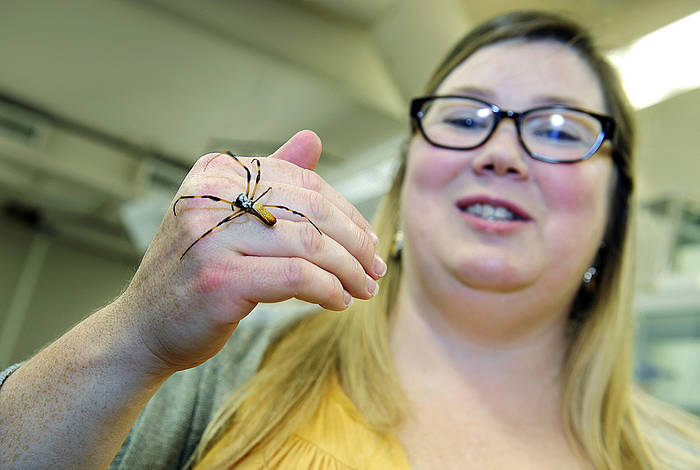
Faculty in the NDSU College of Health Professions mentor both undergraduate and graduate researchers in a variety of research topics including cancer, obesity, targeted prescription delivery, diabetes, Alzheimer’s disease and more.
Benefits of undergraduate research include: increases student grade point averages and greater student retention; assists in pathways to graduate study opportunities; enhances leadership and communication skills; provides greater understanding of science; and builds skills employers seek such as problem-solving, innovation, communication, critical thinking, analytical reasoning and collaboration.
Dr. Brooks in NDSU pharmaceutical sciences outlines her approach when mentoring undergraduates.
Describe your research interests/program:
My research program is at the interface of pharmaceutical sciences, bioengineering, and material sciences. Essentially, we genetically and chemically engineer spider silk to endow it with new biological and material properties that makes it suitable as a "smart" drug delivery system.
"Smart" drug delivery systems are able to be triggered by a biological condition to release their drug payload. Currently, we are developing systems to release an antibiotic only in the presence of an infection; the release of an opioid only in response to a biological signal for pain; and a glue silk that directs integration with bone.
How have undergraduates been involved in your research?
Undergraduates are involved in all aspects of this research from support staff that washes dishes and refills supplies to hands on research that is included in publications, presentations, and grants.
Why do you think it's important to engage undergraduates in research?
In the age of the Internet, it is no longer adequate for the professor to stand in front of the class and convey information to an eager student body. Undergraduate research is a critical part to providing an enhanced learning environment for students that will enhance their career preparation and clarify their path. Plus, it's just fun!
Did you have an undergraduate research experience that inspired your own education and/or career?
I always knew that I wanted to do research and be a scientist, but I did have a great research experience as an undergraduate at the University of Utah. I worked in two labs. In the first lab, we tried to determine how many introductions there were of the common pavement ant to North America and where the ant came from by sequencing mitochondrial DNA.
In the second lab, I did histology on mouse brains in a lab studying muscular dystrophy. I also extracted antibodies from chicken eggs and did Sanger sequencing. These experiences definitely solidified my love of being in the lab and my passion for making sure that undergraduates have a great experience working in the lab.
What is the best thing about being an undergraduate research mentor?
Seeing them get excited about learning and watching them achieve their goals. It's great to think that maybe I played a small part in it.


